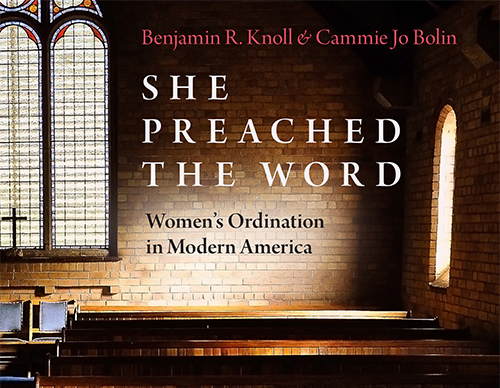A new book, She Preached the Word: Women’s Ordination in Modern America, by Benjamin Knoll and Cammie Jo Bolin (Oxford University Press), asks whether the gender of clergy makes a difference to their effect on the self-esteem and empowerment of those whom they serve. In the case of women, they find, the answer is yes.
In a pair of articles at the Religion News Service, the authors describe the positive effects on the psychological well-being of women whose churches ordain women.
First, in a column published June 29, they explain that even allowing for women’s ordination encourages women, even if they do not have a female pastor themselves.
Women who attend congregations with male-only leadership policies are somewhat less likely than women who attend congregations that ordain women to agree with statements like these:
- “Generally speaking, I can trust my church or congregation to do what is right”
- “I feel that my church or congregation leaders care a lot about what people like me think”
- “People like me have a lot of influence over the decisions made by my local church or congregation”
- “I identify as a member of my church or congregation and I am proud of that identity.”
In other words, when it comes to personal commitment and trust in their religious community, policies that give women the potential of gender equality are psychologically empowering, even if the women’s current leader at that moment happens to be a man.
Interestingly, the same is not true for men. Men are equally invested and trusting in religious communities that do not ordain women as they are in ones that do.
In a follow-up article, published last week, they look at the continuing effects for women who had female clergy leadership as girls or young women.
According to the General Social Survey, nine out of ten Americans report attending religious services at least occasionally in their youth. This means that places of worship are a key setting in which children and young people have the opportunity to observe leadership in action. …
One of our most striking findings is that women who had female congregational leaders in their youth enjoyed higher levels of self-esteem as adults.
Women who said they never had a female religious leader growing up are 10% less likely to agree that they “have high self-esteem” now as adults, and 30% less likely to “strongly” agree, compared to women who had female clergy at least “some of the time.” (In contrast, the same is not true for men. Men who had female congregational leaders frequently growing up have levels of self-esteem that are just as high as those who never had a female pastor or priest.)
It is evident that some people find this research challenging. The second article is introduced with a weary note from its editor, lamenting that the reaction to the first “from the all-male peanut gallery…”
… devolved into a predictable and hackneyed argument about women’s ordination that did not engage the new research but instead rehearsed the same fights Christians have been having for more than a century.
For others, its conclusions give voice and validity to what they have known for some time. July’s article opens with a quote from an Episcopal priest, the Reverend Kedron Nicholson:
I was ordained to the priesthood in the Episcopal Church [in 2003]. When the service concluded I was greeting people in the shaking hands line and a family of four (mom, dad and two little girls) came up and the mom said, “I know we don’t know each other. I hope it’s okay that we came. We wanted our girls to see this and know that they can do anything.”
Read the original RNS posts here.

